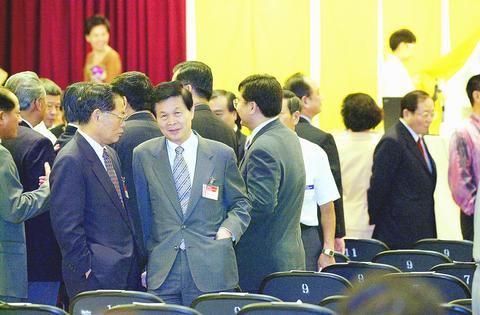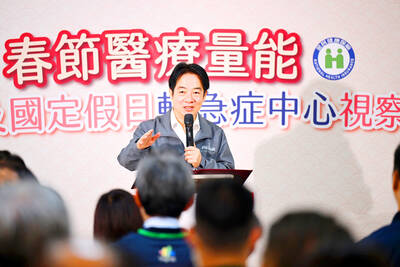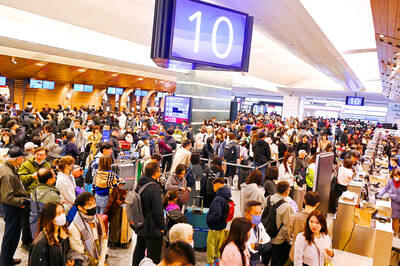The KMT's 210-seat Central Committee yesterday approved the party's slate of nominees for legislator-at-large amid complaints from committee members about their being treated as a "rubber stamp."
Each of the 41 recommended nominees passed ballots by Central Committee members without any surprising twists.
Topping the list of nominees are Legislative Yuan vice speaker Yao Eng-chi (

PHOTO: GEORGE TSORNG, TAIPEI TIMES
A recommended nominee can only be screened out if over half of the Central Committee members vote against him. The order of the nominees will not be rearranged according to the number of approval votes they obtain.
This is the first time the KMT has let the Central Committee vote to decide the legislator-at-large nominees, which is part of the party's plan for internal democratic reform.
However, many outspoken lawmakers in attendance at the Central Committee meeting expressed strong opposition to the ballot rules which they say are undemocratic and give them little room to make changes to the list.
"We Central Committee members are here to serve simply as a rubber stamp," said legislator Chen Ching-pao (陳清寶).
Legislator Apollo Chen (
"Most people on the list are strangers to us, though none of them are our enemies. We don't know how are we going to exercise our right of veto," Chen said.
The 41 nominees were selected by the KMT's nomination review panels from a total of 130 contestants vying for the party's nomination. Only those who rank within the top 16 to 19 are considered likely to win seats, based on a forecast of the KMT's showing in the year-end legislative elections.
A total of 41 legislator-at-large seats are available, and they will be allocated to political parties according to their share of the vote in the constituency-based elections.
In addition to criticism of the ballot rules, reformists within the KMT expressed their disappointment that the party's nominees for legislator-at-large seats weren't innovative enough to renew its image.
"For the KMT, reform has yet to succeed," said Chen Feng-hsing (陳鳳馨), a Central Committee member and former KMT spokeswoman.
Chen said the party should have nominated more high-profile candidates to fill the legislator-at-large seats and win popular support for the KMT's legislative campaign.
Also, as Taiwan is facing its worst recession in decades, the KMT should have nominated as many economic professionals as possible, Chen said.
In response to these doubts, KMT Chairman Lien Chan (
"Today's event marks a very important milestone in the KMT's democratic development. In this process, we will learn how to make democratization more progressive," Lien said.

NON-NEGOTIABLE: The US president’s action ran counter to one of the US’ ‘six assurances’ on not consulting China about arms sales to Taiwan, US lawmakers said US President Donald Trump’s admission that he is discussing arms sales to Taiwan with Chinese President Xi Jinping (習近平) is “alarming and a blatant violation of US policy and the six assurances,” US Representative Ro Khanna said on Tuesday. Trump on Monday said he would decide soon on whether to send more weapons to Taiwan, after Xi warned him not to do so. “I’m talking to him about it. We had a good conversation, and we’ll make a determination pretty soon,” Trump told reporters aboard Air Force One when asked about warnings raised by Beijing during a phone call with Xi over

REAL EMERGENCIES: To avoid overcrowding, the health minister urged people with mild or moderate symptoms to go to UCCs, while the ER should be for critical cases President William Lai (賴清德) yesterday inspected the nation’s Lunar New Year medical preparedness with a visit to an urgent care center (UCC) in Taipei and expressed confidence in the Ministry of Health and Welfare’s plans to prevent emergency room (ER) overcrowding during the nine-day holiday. The ministry in November last year launched a pilot UCC program to provide urgent medical care at 13 clinics in the nation’s six special municipalities over weekends and on holidays, aimed at relieving pressure on crowded ERs. To ease ER overcrowding during the Lunar New Year, when most hospitals and primary care clinics are closed, the National

VACILLATING? Some US officials are concerned that Trump’s April visit to Beijing might be affected if Washington pushes through additional weapons sales to Taiwan A major US arms sales package for Taiwan is in limbo following pressure from Chinese President Xi Jinping (習近平) and concerns among some US officials that greenlighting the deal would derail US President Donald Trump’s upcoming visit to Bejing, the Wall Street Journal (WSJ) reported on Wednesday. Trump on Monday said that he would decide soon on whether to send more weapons to Taiwan, after Xi warned him not to do so. “I’m talking to him about it. We had a good conversation, and we’ll make a determination pretty soon,” Trump told reporters aboard Air Force One when asked about warnings raised

HOLIDAY RUSH: Airport passenger volume is expected to reach a new high, while southbound road traffic would likely peak from Tuesday As Lunar New Year travelers flock overseas, passenger traffic at Taiwan Taoyuan International Airport is expected to shatter records, as Taoyuan International Airport Corp (TIAC, 桃園國際機場), Taiwan’s largest aviation hub operator, projected yesterday’s passenger volume to climb to 167,000. The figure comes after a record single-day high of 161,000 passengers on Thursday, and would surpass the previous pre-COVID-19 pandemic Lunar New Year peak of 166,000 passengers in 2019, TIAC said. Long lines could be seen forming as early as 7am yesterday, filling Terminal 1 of the airport almost to capacity, yet security checks took only 10 to 15 minutes. TIAC urged